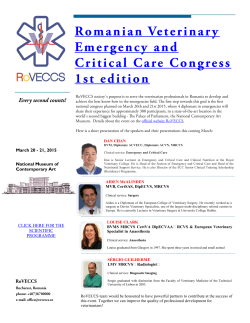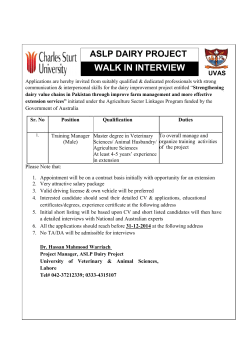
Training on “Use of Data Acquisition System Based Physiograph In
Eligible participants : Post graduate students pursuing Master's or Doctorate degree in any recognised agricultural/veterinary university, central university, deemed universities, medical college/institute and other institutions from the field of pharmacology/physiology or related disciplines. Maximum ten students will be selected for the training programme based on their eligibility and on first come first basis. Registration, Travel and Accommodation: There is no registration fee for the training. Accommodation will be provided in the University guest house/International hostel. Lodging and boarding will be free for participants and participants will be reimbursed their travel fare (to and fro) of the journey undertaken by bus (ordinary class) or train (sleeper class). How to reach Mathura Veterinary University campus: Mathura is well connected by road and rail. Veterinary University campus is about 5 km away from the railway station or bus stand. Climate: Hands on Training on It is quite pleasant during March with average maximum and minimum temperature of 34°C and 27°C, respectively. “Use of Data Acquisition System Based Physiograph in Pharmacodynamic Studies” Application of submission: Application forms should be duly recommended and signed by the concerned Head of Department. Last date for submission of application form is February 15, 2015. The soft copy of duly signed application form may be sent to naepharmaduvasu@gmail.com Hard copy of the form should be sent on the following address: Dr. Satish K. Garg Professor & Head Department of Veterinary Pharmacology & Toxicology & Dean, College of Veterinary Science & Animal Husbandry, DUVASU, Mathura-281001. UP. (India) Contact No: +91-9456054995 Sponsored under ICAR NICHE AREA OF EXCELLENCE PROGRAMME 09 - 13th March, 2015 Course Director Prof. Satish K. Garg (PI) Dean, College of Veterinary Science & Animal Husbandry, DUVASU, Mathura Course Co-ordinators Dr. Soumen Choudhury (Co-PI), Assistant Professor Department of Pharmacology & Toxicology Dr. Dilip Swain (Co-PI), Assistant Professor Department of Veterinary Physiology Dr. Rajkumar Singh Yadav, Assistant Professor Department of Pharmacology & Toxicology For further details, visit to www.upvetuniv.edu.in ys9456684421@gmail.com physiograph was devised which was more sensitive. But during the 21st Century, an advanced version of recording device in the name of “data acquisition system based polyphysiograph” was invented which is much more sensitive and user friendly. This facility is not available in most of the Veterinary and Medical Colleges, therefore, present training has been planned for the benefit of postgraduate students of Pharmacology/Physiology/allied discipline with the basic objective of imparting hands on training to them in smooth muscle physiology and pharmacology using data acquisition system based polyphysiograph. Training will encompass of the following aspects: l Anatomical and physiological aspects of different smooth muscles vis-a-vis other muscles; l Preparation of isolated smooth muscle for vascular and non-vascular tissues; l Recording the response of vascular and non-vascular tissues to different modulators using data acquisition system based physiograph. l Construction of dose response curves and its interpretation; and l Recording of blood pressure by invasive method using pressure transducer. Organised by Department of Pharmacology and Toxicology College of Veterinary Science and Animal Husbandry U.P. Pandit Deen Dayal Upadhyaya Pashu Chikitsa Vigyan Vishwavidyalaya Evam Go-Anusandhan Sansthan, Mathura-281001 (U.P.) INDIA DUVASU - The Host Institute U.P. Pandit Deen Dayal Upadhyaya Pashu-Chiktsa Vigyan Vishwavidylaya Evam Go Anusandhan Sansthan, Mathura, was established in 2001. College of Veterinary Science and Animal Husbandry Mathura, established in 1947, is one of the most premier Veterinary Colleges in the country and is recognized for its significant contributions in the field of animal health and production. Veterinary College has excellent infrastructure and laboratory facilities for undergraduate and post graduate teaching, research and extension. l l l l Govt. of India infrastructural development project for establishment of Toxicological Investigation laboratory under RKVY; Biomonitoring of metallic environmental pollutants and their correlation with reproductive disorders in animals. Ameliorative potential of certain indigenous plants against metal and insecticides toxicity in laboratory animals and birds. Screening of indigenous plants for different paharmacological activities with particular reference to immunomodulation. About the Department Laboratory facilities: Department of Pharmacology and Toxicology, earlier Department of Materia Medica and subsequently the Department of Pharmacology, came into existence in this Institute in 1949. Postgraduate education programme leading to award of MVSc degree in Veterinary Pharmacology was started in 1962 and PhD in 1970. Since its establishment, Department has been actively involved in teaching, research and extension. Till 2013, 82 students have completed their MVSc degree and 11 their PhD degree from this Department. Department has been actively involved in research on medicinal plants, characterization of receptors and ion channels and down-stream-signaling pathways, pharmacokinetics of antibacterial and anti-inflammatory drugs and toxicology of metals and agrochemicals, evaluation of ameliorative potential of certain plants against xenobiotics and therapeutic efficacy of certain drugs. For human resource development and capacity building, Department has established “state of the art research laboratories” to ensure hands on training of students and teachers for undertaking basic, applied and need-based research in frontier and emerging areas of Pharmacology and Toxicology. Department has established state of the art laboratories equipped with modern and advanced equipments. Some of the major equipments available in departmental laboratories include HPLC, GCMS, Atomic absorption spectrophotometer, nanodrop, UV-Spectrophotometer, Spectrofluorometer, fluoridemeter, ELISA reader, geldocumentation system, electrophoresis unit, western blot assembly, thermocycler, organ baths, two-channel and four channel data acquisition-based physiographs, ultracentrifuge, sonicator, CO2-incubator, Biosafety cabinet, fluorescent microscope, plethysmometer, analgesiometer, activity-cage, freeze-drier, and other equipments for routine work and undergraduate teaching as per VCI course curriculum. Ongoing projects l l ICAR Niche Area of Excellence Project on “Toxicodynamic studies on impact of environmental pollutants on bovine reproduction with particular reference to regulatory pathways” ICAR Out-reach Programme on Ethnoveterinary Medicine: Pharmacological studies and development of a polyherbal formulation for reproductive disorders in animals; Conferences, Seminars and Workshops Organized S. N. Title 1 VIII Annual Conference of Indian Society of Veterinary Pharmacology and Toxicology (ISVPT) (Novmber 6-8, 2008) 2 Pre-Conference Workshop (Wet Lab) on “Canine echocardiography and telemetry” accredited by AVMA for CE credits (February 15-16, 2011) 3 IV International Conference of Laboratory Animals Scientists Association (LASA) on “The Challenges ahead” (February 17-18, 2011) 4 National Seminar on “Livestock Policy for National Food and Nutritional Security in the WTO Regulations” and 11th Annual Convocation of National Academy of Veterinary Sciences (India) (November 2-3, 2012) 5 33rd Annual Conference of Society of Toxicology (India) (October 23-25, 2013). Salient Achievements of the Department 2014 Ram Lal Agarwal National Award for outstanding research work on indigenous medicinal plants 2013 Prof R Natarajan Young Scientists Award 2012 ICAR Sponsored Best Teacher Award of the University 2011 Ram Lal Agarwal National Award for outstanding research work on indigenous medicinal plants 2010 Jawahar Lal Nehru Award of ICAR for best PhD Thesis 2008 Prof. V. V. Ranade Young Scientist Award 2008 2009 DST, Govt. of India travel grant (2009). 2004 Best Teacher Award of the University Best Poster Presentation Awards of ISVPT – 2001, 2002, 2009, 2012, 2014 Patents filed: three About the training programme To understand the functional and molecular mechanisms of drug action, unravelling of basic physiology and downstream signaling pathways of different body systems is of paramount importance. Physiologists and pharmacologists over the decades have focussed on understanding and characterizing the receptors and ion channels involved in basic physiology of body systems in humans and animals. Therefore, involvement of receptors, ion channels and other cellular mediators in different physiological and pathological signalling is gaining importance in scientific world. This has not only helped us in understanding the underlying mechanisms of different disease states, but also enabled us in identifying newer and novel therapeutic targets. Smooth muscle cells are uninuclear but have numerous functional communicating units. Unlike cardiac and skeletal muscle cells, they lack striation and T-tubules. Some of them exhibit spontaneous rhythmicity while rest are nonspontaneous. Thus the signalling mechanisms are different from that of other cell types. To characterize the functional existence of these cellular signalling molecules, ever since the discovery of neurotransmitters, biologists, physiologists and pharmacologists have traditionally carried out organ bath experiments and recorded responses of isolated tissues on smoked drum using kymograph. Thereafter, Student's Hands on Training on “Use of Data Acquisition System Based Physiograph In Pharmacodynamic Studies” Under ICAR NICHE AREA OF EXCELLENCE PROGRAMME 09-13th March, 2015 APPLICATION FORM (Fill up in Block Letter) 1. Full Name: ……………………………………………………………………………………… 2. Date of Birth ……....…(D)………….(M)………... (Y) Sex … ………(M/F). 3. Department: …………………………………………..……………………………………....... 4. Organization: ………………………………………..………………………………………...... 6. Postal Address: ……………………………………………………………………………………….... ……………………………………………………………………………………………………… ……………………………………………………………………………………………………… ……………………………………………………………………………………………………… 7. City ………….... Post/Zip code……..………… Country ……….……..... 8. Mobile Mo. ……………… Email . ………………………………... 9. Highest academic qualification obtained…………………………….. Date: Place: Signature of Applicant 10. Recommendation of the forwarding institute Signature: Designation: Date: Address: CERTIFICATE It is certified that the information furnished by the participants is verified with the office records and found correct. Signature and designation of the sponsoring authority
© Copyright 2025













